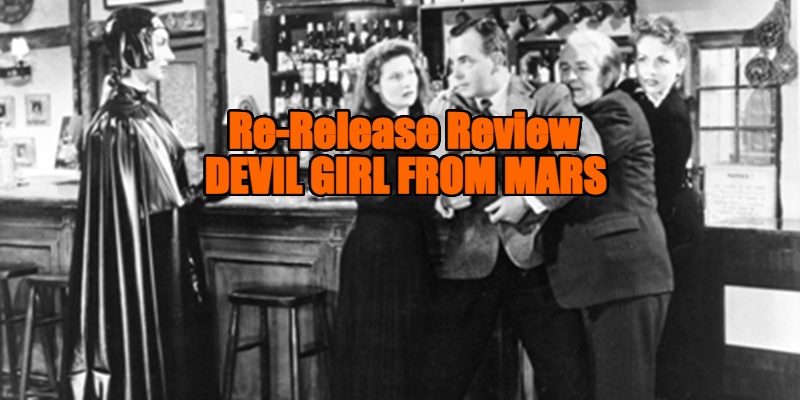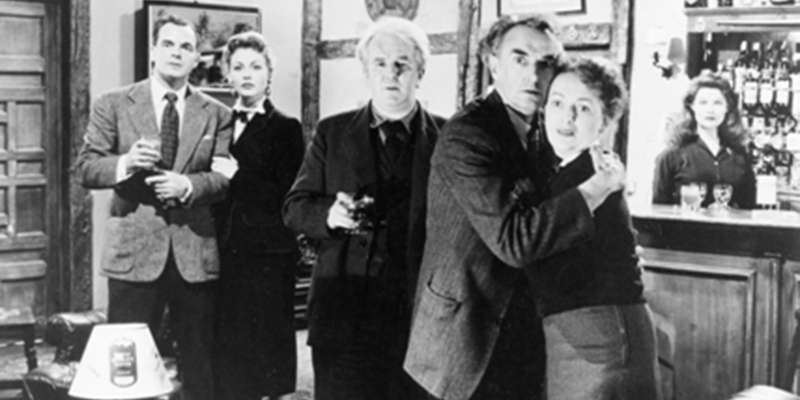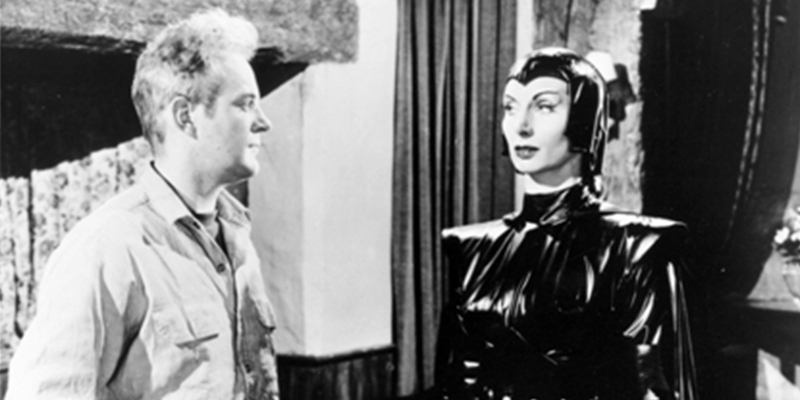
Review by
Eric Hillis
Directed by: David MacDonald
Starring: Patricia Laffan, Hugh McDermott, Hazel Court, Peter Reynolds, Adrienne
Corri

A popular dramatic conceit in the early decades of the talkies was to have
a bunch of strangers held hostage in a single location by a dangerous
criminal. It meant that money that might otherwise be squandered traipsing
around various locations could instead be spent on star power, and it gave
us gems like The Petrified Forest and Key Largo. For b-movie producers it was a no-brainer that allowed them to exploit
studio space, often knocking out an extra film at the end of a larger shoot.
That was the case with 1954's Devil Girl from Mars, which was rushed into production to avail of a three week block of rented
studio space at Shepperton that became available when the production of
Calling Scotland Yard wrapped up ahead of schedule.
Director David MacDonald's film sticks close to the established
format. It features a group of strangers stuck in a remote Scottish inn with
an escaped convict. The twist here is that the threat isn't posed by the
convict, who claims he's innocent of the charge of killing his wife, but
rather from...you guessed it, a devil girl from Mars.

The titular villain is something of an enduring icon in the world of
British sci-fi. Played with malevolent relish by Patricia Laffan,
Nyah sports a black PVC outfit that likely would have stirred up recent
memories of Nazis in its 1954 audience, and which now looks like a precursor
of Vivienne Westwood's '70s punk wardrobes.
Headed for London in search of studs to repopulate her planet after all the
native Martian men were wiped out in a war of the sexes, Nyah crashlands in
the Scottish moors, just outside an inn.
Assembled inside are the innkeepers, Mr and Mrs Jamieson (John Laurie
and Sophie Stewart); their lovelorn barmaid (Adrienne Corri)
and her escaped convict lover (Peter Reynolds); a heartbroken model
(Hazel Court); an Irish scientist (Joseph Tomelty); and the
obligatory big wooden American lug, a newspaper man played by
Hugh McDermott, actually a Scottish actor whose performance is as
stiff as the drinks he constantly knocks back.

Movies of this sort often see a lot of bickering between the hostages as to
how they should deal with their predicament, but everyone here is
collectively focussed on defeating Nyah. It's no easy task, as she readily
demonstrates her powers by evaporating a handyman ("a worthless specimen"),
erecting an invisible force field around the inn and having her robot
henchman Chani commit acts of vandalism against any structures that get in
his way. Chani is a cheap knockoff of Gort from
The Day the Earth Stood Still and walks with the clunkiness of
a pensioner negotiating their driveway on an icy morning.
Devil Girl from Mars was released the same year as the
American sci-fi b-movie Target Earth, which boasts an almost identical setup, albeit its action playing out in
a cocktail lounge rather than a Highland inn. The two movies demonstrate the
cultural differences that still existed between the US and UK at that point.
The histrionics of Target Earth are countered here by classic
British stoicism, represented chiefly by Mrs Jamieson, who hilariously
declares "If we've only got hours to live we might as well have a cup of
tea." The movie's portrayal of relationships is very much of its time, with
Court's model declaring her undying love for McDermott's hack within an hour
of first meeting the big lug. The presence of John Laurie gives the film the
feel of a Dad's Army episode in parts.

The movie is conversely also quite ahead of its time in some aspects, none more so
than the kinkiness of Nyah's outfit, which looks like the version of Darth
Vader you might find in a porn parody. There are moments where Laffan
swishes her cloak in aggravation that make you wonder if George Lucas might
have been a fan. Laffan plays the part with the displeased demeanour of a
substitute teacher lumbered with a classroom full of idiot kids, and Nyah's
humble-bragging over her race's superiority over humans is like a dry run
for Leonard Nimoy's Spock. What an effect Laffan must have had on young
budding feminists at the time, not to mention their sweaty-palmed
boyfriends.
Perhaps the most impressive part of Devil Girl from Mars is
the effect of Nyah's exploding spaceship that ends the film. Eschewing the
usual balls of fire of the era, SFX director Jack Whitehead instead
delivers an ever-growing plume of smoke which viewed today, bears an eerie
resemblance to the footage of the Challenger shuttle explosion.

